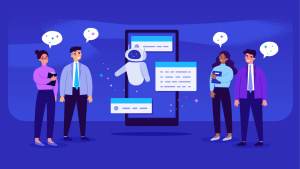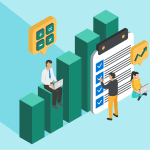AI-Powered Agents Won’t Take Your Job, They’ll Improve It

New AI Agents are replacing clunky copilots and chatbots, freeing up staff to be more creative.
Imagine a world in which you call a company’s helpline and you get straight through to an operator. No menu choice. No plinkety-plink muzak. No “press 5 to lose the will to live”. Better yet, that operator understands what you need to do and deals with your query quickly and efficiently. New AI-powered agents make this possible.
Agents, trained on large language models and with access to a company’s sales systems and data, can communicate with customers at any time of day or night in the customer’s preferred language. They can help callers find products and make purchases by guiding search queries and making personalised recommendations.
That’s what the Agentforce World Tour London event showcased and it’s why AI-powered agents are not just good for companies and their customers, they are also good for their staff.
Studies show that many employees lose as much as 40 per cent of their time doing low-value and repetitive tasks. An AI Agent can take over those tasks, leaving humans to do what humans do best – come up with imaginative solutions.
We asked Zahra Bahrololoumi, CEO of Salesforce UK and Ireland, and some key Salesforce customers how they are harnessing the power of AI – and mitigating the risks posed by such powerful new technology.

Zahra Bahrololoumi CBE
Executive Vice President and CEO of Salesforce UKI
Every few years of my working life, I’ve seen a major new technological shift — from the move from company hard drives to cloud computing, the transition from desktop to mobile, and the rise of social media. And now the biggest shift — the AI revolution — is underway.
New AI-powered agents offer companies a way to embrace customers. Agents answer a call the first time, can solve problems, recommend products, and are programmed to hand over to a human if they cannot meet the caller’s need. No more clunky copilots and chatbots. No more “computer says no”.
AI-powered agents can be set up in minutes using prebuilt templates and customised fast with low-code. Once created, they can get to work immediately on company platforms or WhatsApp. They can easily be scaled up across a business. Because Agents never sleep, they continually analyse their own performance and recommend improvements.
The productivity gains for companies are remarkable. One of our customers, Simplyhealth, saw a 90 per cent reduction in email response time when using Agentforce. At our recent Agentforce event in London, we demonstrated how Saks Fifth Avenue is using AI-powered agents to make style and size recommendations to customers and expedite delivery if a customer needs a new outfit quickly for a work trip or an event.
Some critics warn that AI agents that can “think” for themselves will become conscious and outsmart humans. We should all guard against the risks such powerful new technology might pose. That’s why, as far back as 2018, we established an Office of Ethical and Humane Use to guide the responsible design, development and use of all Salesforce technologies and data use and storage.

Adolfo Hernandez
CEO of Capita, the outsourcer which supports UK and European clients
We already use generative AI in our call centres. It’s very popular not just with callers but with staff. When we trialled our latest AI in one call centre in the north of England, many of the other agents in other centres said: ‘Hey, why only them? We want it, too!’
Employees want to be part of the AI revolution because AI does many of the repetitive tasks that they previously performed. AI produces a live transcript of a call, identifies the caller’s sentiment using colour codes, and suggests solutions to issues raised in real time and afterwards. When the call is over, it automatically summarises the exchange.
This is the real power of AI. It enables the machine to do what the machine can do best, freeing up the agent to do what humans do best: listening, engaging and proposing a creative way forward.
We don’t use AI in any way that our customers and callers might be uncomfortable with. When we started using AI we set up guard rails, guided by our partners like Salesforce. We also, of course, have our own Capita AI policies, monitoring what we are doing with the product, and what information it learns, uses, and retains, all of which we have reviewed with our customers. We rewrite our AI rule book all the time.

Ujjwal Singh
Chief Product and Technology Officer of Multiverse, the AI-powered learning platform
Companies and their staff lose 25 days a year to data skills gaps. Multiverse fixes that problem through learning. We use AI to diagnose a problem – identifying the gap between employees’ skills and employers’ needs. Our AI-powered platform then prescribes a solution. We use AI alongside human coaches to give staff the skills they and the company need.
With Atlas, the AI coach we launched in February, we’ve noticed that interactions between the AI coach and the human apprentice very quickly become personal. Together the human and the machine break down the problem into steps. It’s like an interaction between people. That’s amazing to me. It also means our tools are accessible and intuitive, particularly to people over 40 or with additional learning needs.
We use OpenAI’s APIs for Natural Language Processing (NLP), which gives us control over data use. This is very important for customers.
Some people worry that AI will take the jobs of humans. I don’t think that’s right. People with AI skills will take jobs from people without AI skills. More than half of workers have received fewer than five hours of training on AI. A lot of the fear around AI comes from that: the fear of being left behind. With proper training, and a careful understanding of how to combine the human with the AI in business, that’s where the growth, productivity gains, and jobs will be.

Jenna Goldstein,
Partner at management consultants, The Berkeley Partnership
AI is more than a tool, it’s a way of doing business. People often make the mistake of simply asking how they can apply AI to existing processes in their organisation. The real question to ask is: what do we need, or want, AI to do? How can we use it to make current processes more efficient, generate new ways of working, facilitate innovation, or even create and deliver new services?
We often see AI doing the first task of the process and then we – the humans – come in after that. For example, in organisations which have to consume lots of documents and summarise them, like audit or regulatory services, AI can do the first pass much faster and often more effectively. This frees up the human to focus on the most important or complex parts.
Generative AI is also great for what I call “bringing another person into the room” when I am working. I give the AI a persona and use that to help generate ideas, add another perspective, and create first drafts. I use AI to challenge my own thinking, asking it to counter and improve my ideas.
That’s how to think about the future of AI. It is good at tasks, not jobs, for instance, pattern matching, producing summaries of information, and looking for gaps in rules. But humans are best at empathy and creative thought.
Part of using AI effectively means understanding and avoiding its risks, such as protecting our own and our clients’ data. At Berkeley, we prioritise client data security by carefully managing our AI tools. We either operate these tools within the client’s secure environment or in ways that do not specify proprietary information.
The new EU AI Act means organisations must increasingly consider transparency and be able to explain why certain decisions have been made, especially if they could be considered harmful. As familiarity with the Act and AI practices grows, I believe it will become second nature for organisations to manage risk and develop ethical ways of working.






















